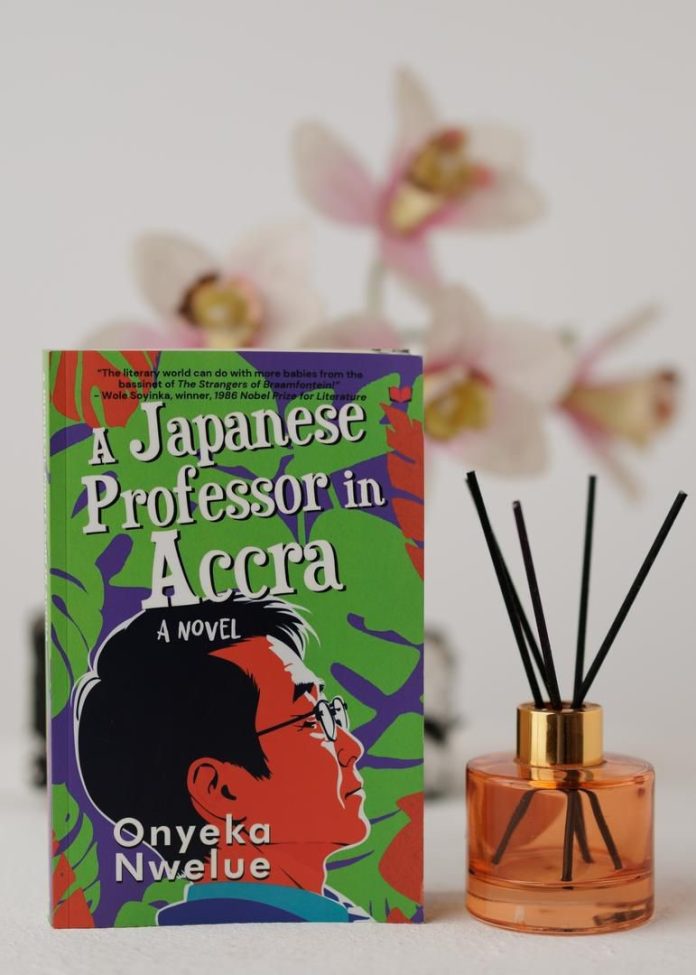
In a world where politics, economics, and diplomacy often dominate discussions about international relations, literature continues to quietly but powerfully shape how cultures encounter one another. Writers create bridges that go beyond formal agreements and policies, connecting human experiences across continents.

In his latest novel, A Japanese Professor in Accra, Onyeka Nwelue demonstrates how fiction can serve as one of the most effective forms of cultural diplomacy — offering fresh perspectives on Africa, Japan, and the bonds that can grow between them.
The novel follows Professor Hideki Suzuki, a Japanese endocrinologist who visits Ghana to deliver a lecture. While the storyline revolves around his professional mission, it soon unfolds into something larger: a journey of cultural discovery, exchange, and transformation. Through Suzuki’s eyes, readers are introduced to Ghana not as a distant, abstract space, but as a living society with vibrancy, traditions, and challenges that demand engagement and respect.
By situating a Japanese character in Africa, Nwelue makes a bold literary move. He brings two cultures often imagined as distant into intimate conversation. This meeting of worlds reveals not only contrasts but also resonances, demonstrating how much societies can learn from one another.
Across history, literature has often acted as a bridge between worlds. African literature has connected the continent to Europe, the Americas, and Asia, offering narratives that dismantle stereotypes and affirm shared humanity. Similarly, Japanese literature from the haiku of Matsuo Bashō to the contemporary novels of Haruki Murakami has allowed readers worldwide to glimpse into the subtleties of Japanese life and philosophy.
What Nwelue achieves in A Japanese Professor in Accra is a blending of these traditions. He introduces African readers to a Japanese protagonist navigating Ghanaian realities, and at the same time, he offers global audiences an African setting that is both specific and universal. This act of storytelling becomes a form of cultural diplomacy, fostering empathy and dialogue where official channels may falter.
While the novel is fiction, it mirrors real and growing ties between Africa and Japan. Over the past few decades, Japan has invested significantly in African economies, development projects, and education. Initiatives like the Tokyo International Conference on African Development (TICAD) highlight Japan’s interest in strengthening partnerships across the continent.
But beyond policy and trade, cultural understanding remains essential. Literature like Nwelue’s contributes to this softer dimension of diplomacy by humanizing these connections. Instead of statistics about aid or investment, readers encounter the story of a Japanese professor navigating Ghanaian life, and through him, they reflect on the ways individuals from different continents can engage meaningfully.
One of the remarkable aspects of Nwelue’s work is how it reimagines Africa in relation to the wider world. Too often, African stories in global literature are framed in isolation, focusing only on internal struggles or domestic narratives. A Japanese Professor in Accra disrupts this pattern by situating Africa as a site of encounter, dialogue, and collaboration with another non-Western culture.
In this way, the novel challenges the binary of ‘Africa and the West’ and instead inserts Africa into a broader global conversation. The relationship between Ghana and Japan becomes a metaphor for Africa’s diverse and dynamic interactions with the rest of the world.
At its core, literature thrives on the human dimension, the everyday encounters, emotions, and reflections that make global politics personal. In Suzuki’s journey, readers see how culture is not abstract but lived: in food, language, relationships, and even misunderstandings. These details remind us that cross-cultural engagement is not only about grand policies but also about how individuals adapt, learn, and grow when placed in new environments.
Onyeka Nwelue’s A Japanese Professor in Accra is more than just a novel. It is a literary bridge between continents, inviting readers to rethink the connections between Africa and Japan. By weaving together narrative, culture, and humanity, Nwelue shows us that literature remains one of the most effective tools for bringing worlds together.
In an era of globalization, such stories are crucial. They remind us that beyond trade agreements and political summits, what sustains true relationships between peoples are empathy, understanding, and imagination — qualities that literature cultivates best.
Onyeka Nwelue is a Nigerian scholar, filmmaker, jazz musician, and publisher whose interdisciplinary work spans literature, cinema, and cultural studies. He has authored over 40 books, including The Strangers of Braamfontein, which won the Crime Fiction Lovers’ Awards and was described by Nobel Laureate Wole Soyinka as “raunchy.”
At the age of 18, Nwelue moved to India, where he wrote his debut novel, The Abyssinian Boy, which won the TM Aluko Prize for Fiction and the Ibrahim Tahir Prize for First Book in 2009. Nwelue has held several academic positions globally. He was an Academic Visitor at the University of Oxford, a Visiting Scholar at the University of Cambridge, a Visiting Research Fellow at Ohio University, and a Research Associate at the University of Johannesburg and a Guest Lecturer at NSS College, Ottapalam.
His latest work, The Nigerian Mafia: Mumbai, the first in a ten-book series set across ten countries, has been longlisted for the 2023 Chinua Achebe Prize and winner for the 2023 ANA Prose Prize. The novel is currently being adapted for film by Indian filmmaker Ramesh Raparthy. He is author of A Japanese Professor in Accra and lives in Mexico, where he is the director of the Africa Center.
Post Views: 35


AloJapan.com